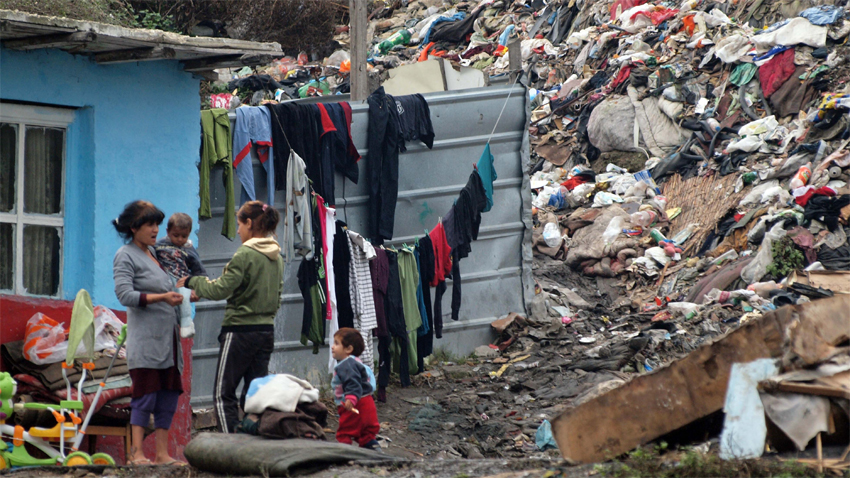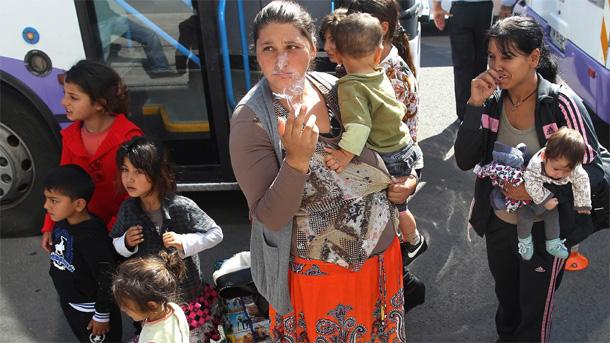A Bulgarian anecdote tells about the greatest dream of the Roma minority – to cut up and sell the Eiffel Tower as scrap metal. While this is just a joke, the truth is that in the autumn of 2013 French police arrested near Paris Roma from Romania and Bulgaria as they were stealing copper cables. Probably the most prosperous profession in Bulgaria is that of the manufacturer or retailer of keys and padlocks.
In fact, those members of society, mostly Roma who earn a living by collecting and selling as scrap metal objects, often steal from rural houses and yards, sometimes using violence. There are striking cases when one locks their rural cottage in autumn, just to find rubbles in the spring, as the walls were destroyed in order to get the reinforcing metal rods inside. After a great number of cases of violent crimes against elderly people too, the Bulgarian police finally started taking some measures. Effects, however, will be temporary as the Roma issue is extremely complex and their integration cannot be delayed.

No matter how much effort and European money is spent for the Roma integration in society, the results are not optimistic. High unemployment among the Roma leads them to desperate poverty and crime. Amid continuing demographic crisis the Roma quickly multiply but the local labor market could not use these people. The main reason is the lack of education.
A study of the Social Ministry two years ago showed that over 7 percent of Roma had never attended school. 8.3 percent have not completed their elementary education. Some 10 percent managed to finish the 4th grade but according to Bulgarian legislation these people are still illiterate, says Deyan Kolev, chairman of the Amalipe Foundation. According to him 25 percent of the Roma in Bulgaria cannot get even the lowest professional qualification.

"The number of Roma with higher education is alarmingly low. Just 0.5 percent of the Roma have graduated from a university. In comparison 25.6 percent of ethnic Bulgarians have university degree. Five percent of ethnic Turks also have higher education. According to the census of 2011, only 9 percent of Roma have secondary education, which is a very low result.”
 What can be done in this situation?
What can be done in this situation?
One way to earn a living for the Roma is in the business with scrap metals. Some 6 million euro is the annual turnover at the black scrap metal market, it was revealed at a discussion, recently organized by the 24 Chasa Daily. Closing the scrap yards where marginalized Roma are the most frequent visitors could stop the criminal activities of those engaged in the business,” many Bulgarians say.
“Begging and aggressive panhandling is mostly controlled by gypsy clans,” says municipal councilor from the IMRO party Angel Djambazki. “This is a business for hundreds of millions of euros per year across Europe. This is what the statistics of western countries that are affected by pickpocketing and begging show.”
This is also one of the reasons for prejudice in Europe against Bulgarians, Mr. Djambazki adds. "This is not due to the behavior of Bulgarian students, scientists or workers who earn an honest living and contribute to the economic growth of these countries. These prejudices are due to gypsy gangs of thieves, prostitutes and beggars throughout Western Europe, creating a bad image for Bulgaria and Bulgarian society. "
However, some good examples exist. There are some Roma who have found their place in other European countries and work honestly as construction workers, janitors, etc.
English version: Alexander Markov
The international wine festival "Bolgrad Wine Fest" is opening today in the unofficial capital of ethnic Bulgarians in Ukraine - Bolgrad. The two-day event will be held at the Center for Culture and Recreation. For the first time, within the..
The 33rd Bulgarian polar expedition is heading to Antarctica to continue its scientific research in cooperation with scientists from different countries. For the first time, travelers from two Balkan countries - Greece and Montenegro, as well as from..
The program of the Orthodox Book Week offers meetings with authors, publishers and translators of Orthodox books from the last few years. The event is held until November 10 at the ''St. Procopius of Varna'' Church, with meetings taking place every..
Modernizing critical thinking skills, fact-checking skills and media literacy are essential for society, especially for young people in Bulgaria - the..

+359 2 9336 661
